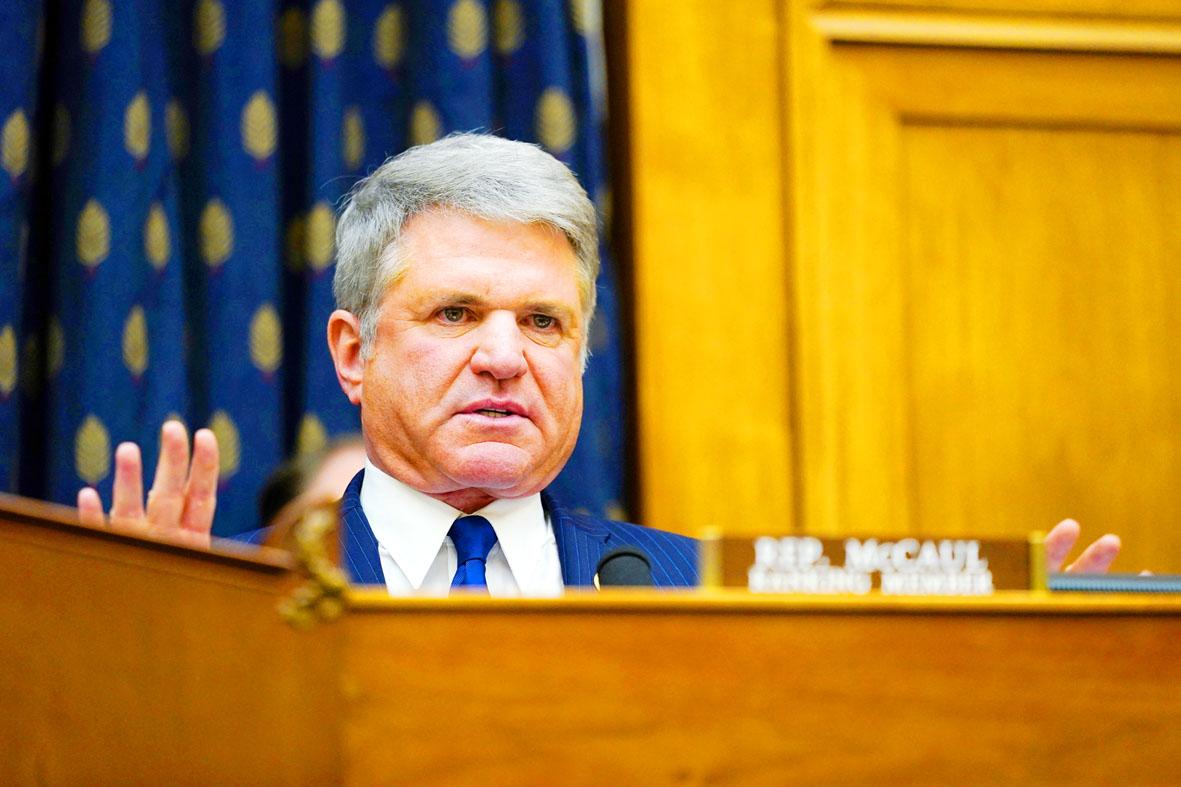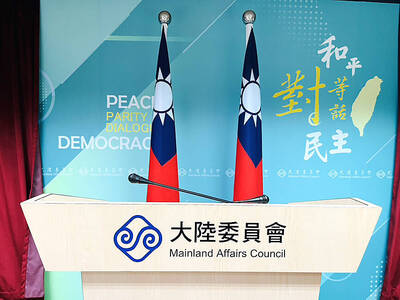Two US lawmakers on Thursday introduced a bill to the US Congress to track and expedite the delivery of US arms sold to Taiwan amid growing tensions between Taipei and Beijing.
The arms exports delivery solutions act was introduced by Republican US representatives Young Kim and Michael McCaul, who are both on the US House of Representatives Foreign Affairs Committee.
The bill seeks to ensure that “defense equipment already purchased from the US by Taiwan and other allies in the [Indo-Pacific] region are tracked and delivered as efficiently as possible as the Chinese Communist Party [CCP] eyes further aggression,” Kim said in a statement.

Photo: AP
“Delayed deliveries of congressionally approved sales to Taiwan are undermining our ability to deter an attack from China,” McCaul said. “This is incredibly concerning as China ramps up its belligerence towards Taiwan.”
China says it wants to unify with Taiwan through peaceful means, although it has not denounced the use of force to achieve that goal. It has stepped up economic, political and military pressure on Taipei over the past few years, as the Democratic Progressive Party government refuses to accept the so-called “1992 consensus.”
Beijing has also accused Taipei and Washington of trying to alter the “status quo” in the Taiwan Strait. It has repeatedly sent military aircraft into Taiwan’s air defense identification zone, drawing condemnations from Taipei and Washington.
As a result, some US lawmakers have spoken out in favor of prioritizing weapons sales and deliveries to Taiwan.
The bill would require US President Joe Biden’s administration to submit a report to Congress before March 1 next year listing the approved sales of US defense articles or services worth US$25 million or more to Taiwan, Japan, South Korea, Australia and New Zealand that have not been fully delivered.
The report should provide reasons for any changes or delays on the part of the US in its transfer of the approved defense items while outlining possible measures the US can take with the Congress’ authorization to provide “interim capabilities or solutions” to its partners subject to such delays.
The report should also provide a description of “the actions the United States is taking to expedite deliveries of defense articles and services to Taiwan,” the bill says.
Prioritizing the defense needs of Washington’s allies and partners is “a national security priority,” and the US’ sustained support for the defense of its key partners benefits Americans and international trade, it says.
The “1992 consensus” — a term that former Mainland Affairs Council chairman Su Chi (蘇起) in 2006 admitted making up in 2000 — refers to a tacit understanding between the Chinese Nationalist Party (KMT) and the CCP that both sides of the Taiwan Strait acknowledge that there is “one China,” with each side having its own interpretation of what “China” means.

The Central Weather Administration (CWA) yesterday said it is expected to issue a sea warning for Typhoon Fung-wong this afternoon and a land warning tomorrow. As of 1pm, the storm was about 1,070km southeast of Oluanpi (鵝鑾鼻), Taiwan’s southernmost point, and was moving west-northwest at 28 to 32kph, according to CWA data. The storm had a radius of 250km, with maximum sustained winds of 173kph and gusts reaching 209kph, the CWA added. The storm is forecast to pass near Luzon in the Philippines before entering the South China Sea and potentially turning northward toward Taiwan, the CWA said. CWA forecaster Chang Chun-yao (張峻堯) said

PREPARATION: Ferry lines and flights were canceled ahead of only the second storm to hit the nation in November, while many areas canceled classes and work Authorities yesterday evacuated more than 3,000 people ahead of approaching Tropical Storm Fung-wong, which is expected to make landfall between Kaohsiung and Pingtung County this evening. Fung-wong was yesterday morning downgraded from a typhoon to a tropical storm as it approached the nation’s southwest coast, the Central Weather Administration (CWA) said, as it issued a land alert for the storm. The alert applies to residents in Tainan, Kaohsiung, Pingtung and Taitung counties, and the Hengchun Peninsula (恆春). As of press time last night, Taichung, Tainan, Kaohsiung, and Yilan, Miaoli, Changhua, Yunlin, Pingtung and Penghu counties, as well as Chiayi city and county had

The Central Weather Administration (CWA) yesterday issued a sea alert for Typhoon Fung-wong (鳳凰) as it threatened vessels operating in waters off the Pratas Islands (Dongsha Islands, 東沙群島), the Bashi Channel and south of the Taiwan Strait. A land alert is expected to be announced some time between late last night and early this morning, the CWA said. As of press time last night, Taoyuan, as well as Yilan, Hualien and Penghu counties had declared today a typhoon day, canceling work and classes. Except for a few select districts in Taipei and New Taipei City, all other areas and city

VIOLATION OF NORMS: China’s CCTV broadcast claimed that Beijing could use Interpol to issue arrest warrants, which the MAC slammed as an affront to order The Mainland Affairs Council (MAC) yesterday condemned the Chinese Communist Party (CCP) for attempts to intimidate Taiwanese through “transnational repression.” The council issued the remarks after state broadcaster China Central Television (CCTV) yesterday during a news broadcast aired a video targeting Democratic Progressive Party (DPP) Legislator Puma Shen (沈伯洋), threatening him with “cross-border repression” and saying: “Stop now, or you will be next,” in what Taipei officials said was an attempt to intimidate not only Shen, but also the broader Taiwanese public. The MAC in a statement condemned the threat, accusing Beijing of trying to instill fear and self-censorship among Taiwanese and